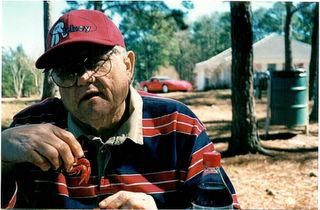A Leave From Absence

Sometimes a pet’s name doesn’t sink in, doesn’t take. I read once that pets, especially dogs, can best learn their name if it contains two distinct syllables. Perhaps thus was spawned Fi-do and Fi-fi. So when we tagged our animal-shelter survivor as “Cosmo Topper Puppy Moore,” his moniker was doomed from the beginning. He learned the “Puppy” part, and the rest of his label seemed to fall on peanut-buttered ears. So “Puppy” it became.
Puppy was epileptic. We didn’t know dogs could be, but yes, the recurring seizures are not unlike those of their human friends. But he lived beyond his odds, finally giving in to the toll at age fifteen. Owners all know that the loss of a pet exacts a predictable reaction:
“That’s it,” I said. “No more dogs. I never want another. I can’t go through that pain again.” A bear hug from my wife Kay signaled that she felt the same.
For eight years, we were satisfied with our lone housecat, “Read-‘Em-a-Clipping News Carver Moore.” Knowing that cats only answer to kitty-kitty—and only if they choose to—we had deliberately splurged on his name.
One Saturday afternoon, at a large outdoor bazaar near Dallas, we saw signs directing visitors to “Pet Island.” I thought… petting zoo? Let’s check that out. Instead, it was a pet marketplace, where vendors and breeders came together in a truer sort of “flea” market. It had a festival atmosphere, complete with clowns and characters dressed in stuffed-animal attire. There was Winnie the Poo, Tigger, some sports-team mascots, and a couple of gigantic pullets flapping about, unable to take wing. I also recognized the celebrity Smokey Bear, apparently on fire-holiday thanks to recent rains. All these frolicking critters were handing out animal crackers to the children.
“It’s just Disney-like hypnosis—a marketing gimmick for the kids out here,” I muttered cynically.
We strolled past pens and containers with boas, miniature goats, and pot-bellied pigs—the “desperation” choices for pet lovers, or at least intended for folks more adventurous than me. Then I saw the picket fence, with an ivy-covered gate labeled “Man’s-Best-Friend Resort.” My thoughts raced back to Puppy Moore, and I tarried at the entrance. Just out of sight, I could hear the joyful mingle of excited yelps and shrieks of joy from small children. It would be a mistake to enter here.
Kay touched my arm softly, beckoning me on with welled eyes. We moved through the gate together, as if facing up to some intentionally delayed appointment.
This was not ordinary puppy-mill territory. AKC professional kennels and regal-sounding breeder farms dotted both sides of a cedar-shavings walkway. It was a red-carpet welcome. No hawking of wares, no carnival hucksterism. Instead, it was a best-behavior collection of well-groomed and coiffed animals—with masters to match.
“The Rocking-A Kennel” caught my eye. Their breed line was the Australian Shepherd. For me it was a first introduction, as I had never met an “Aussie.” From the rack, I browsed their pamphlets about the coloration differences; blue, and red merle. With faces less sharp than Lassie’s, the adults nonetheless showed strains of Collie or maybe Border Collie, but with the odd ending of a bobbed-tail. I was impressed with what appeared to be a perfect blend of strength and poise. I was also mystified by their eyes—one gold and one blue.
The parents of the litter were being presented to the public in royalty fashion. They were lounged on a spread of artificial turf, almost engulfed by an amphitheatre of trophies and ribbons.
“Sire Tommie-On-Cudgegong and Dame Rachel Wurnshire-Heather,” the sign said. So much for simple two-syllable names, I thought. “Cosmo Topper Puppy Moore” suddenly seemed quite sensible.
Next to this pedigree-castle sat a child’s playpen. Inside were the princes and princesses of the Crown. As we leaned into the enclosure, our faces must have looked like Halloween lanterns beaming from above. As each of the four puppies stared up with cocked heads, one scrambled toward us from the farthest corner. He reared up on hind legs and strained toward my nose with all his power. As he got close, I swear I heard something of a whisper from him…”Pick me!” There. I heard it again. “Pick me,” the voice said, this time with emphasis.
I plucked him from the playpen and held him to my chest. He was the size of a child’s football, mostly fur, with a red tongue darting in and out. His whimper spoke louder than any car-salesman’s wail. There was no putting him back. I paid the price without even haggling—shooing away the checkbook sentinel who had so rudely reminded me that my first house payment wasn’t this much.
On the ride home, we agreed to call him “Quigley,” after the character in the Australian-setting television show. From that first day, he has validated the wisdom of our selection many times. I have marveled at his innate kindness and intelligence, his remarkable obedience, and his penchant for wanting to “herd” anything that moves, including the occasional errant dust-bunny.
Raising pets, like rearing children, is the great educator. Profiting from experience, Kay and I had agreed on certain strict house-pet rules. Quickly it became evident that our concerns had been unnecessary. His potty and furniture training tasks were mastered so quickly that our home soon became free range.
We have learned that the more time we spend with Quigley, the more he is able to reveal his intelligence. We were especially struck by his ability to accurately identify each of his four rubber chew-toys. They are the same size and shape, differing only in their colors.
“Get your red one,” I say, showing off to friends.
“Now go find your black one.” It works every time.
My friends all maintain that dogs are color blind. My Internet searches have supported that notion. I don’t claim to understand it. All I know is when I say, “Quigley, go get your yellow one,” he does. So I just accept it as a wonderful gift and constantly search the pet stores for new colors to add to his palette.
I have never read a book about Aussies. I have learned about Quigley by observing and interacting. I can cup his face in my palms, lock his eyes with mine, and see far into his soul. I can sense in those moments he is returning the favor. In times of laughter his wag signals that he gets the joke. In distress or sorrow his nuzzle assures us he understands. If we leave the house without him, he welcomes us back with frenzied murmurs and frantic smooches. Competing for those special rushes of attention, my wife and I may be heard to whisper…
“Pick me.”
* * *
© Copyright 2006 by the author, Lad Moore
"Quigley" (The Quig) is now eight, and is my constant companion on the farm and woods trails.


